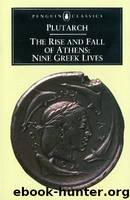The Lives & Moralia Anthology by Plutarch

Author:Plutarch [Plutarch]
Language: eng
Format: epub
Tags: History, Ancient, Greece, General, Europe, Biography & Autobiography, Historical, Literary Collections, Ancient & Classical
Published: 0101-01-01T00:00:00+00:00
When Metellus asked him who his father was, Your mother, said he, has made that question a harder one for you to answer than for me. For she was unchaste, while Metellus himself was a light, inconstant, and passionate man. The same Metellus, when Diodotus his master in rhetoric died, caused a marble crow to be placed on his monument; and Cicero said, he returned his master a very suitable gratuity, who had taught him to fly out not to declaim.
Hearing that Vatinius, his enemy and otherwise a lewd person, was dead, and the next day that he was alive, A mischief on him, said he, for lying.
To one that seemed to be an African, who said he could not hear him when he pleaded, And yet, said he, your ears are of full bore.
He had summoned Popilius Cotta, an ignorant blockhead that pretended to the law, as a witness in a cause; and when he told the court he knew nothing of the business, On my conscience, I’ll warrant you, said Cicero, he thinks you ask him a question in the law.
Verres sent a golden sphinx as a present to Hortensius the orator, who told Cicero, when he spoke obscurely, that he was not skilled in riddles. That’s strange, said he, since you have a sphinx in your house.
Meeting Voconius with his three daughters who were ill favoured, he whispered to his friends that verse, -
“Children he hath got,
Though Apollo favoured not.”
When Faustus the son of Sulla, being very much in debt, set up a notice that he would sell his goods by auction, he said, I like this proscription better than his father’s.
When Pompeius and Caesar fell out, he said, I know whom to fly from, but I know not whom to fly to. He blamed Pompeius for leaving the city, and for imitating Themistocles rather than Pericles, when his affairs did not resemble the former’s but the latter’s.
He changed his mind and went over to Pompeius, who asked him where he left his son-in-law Piso. He answered, With your father-in-law Caesar.
To one that went over from Caesar to Pompeius, saying that in his haste and eagerness he had left his horse behind him, he said, You have taken better care of your horse than of yourself.
To one that brought news that the friends of Caesar looked sourly, You do as good as call them, said he, Caesar’s enemies.
After the battle in Pharsalia, when Pompeius was fled, one Nonius said they had seven eagles left still, and advised to try what they would do. Your advice, said he, were good, if we were to fight with jackdaws.
Caesar, now conqueror, honourably restored the statues of Pompeius that were thrown down; whereupon Cicero said, that Caesar by erecting Pompeius’s statues had secured his own.
He set so high a value on oratory, and did so layout himself especially that way, that having a cause to plead before the centumviri, when the day approached and his slave Eros brought him word it was deferred until the day following, he presently made him free.
Download
This site does not store any files on its server. We only index and link to content provided by other sites. Please contact the content providers to delete copyright contents if any and email us, we'll remove relevant links or contents immediately.
| Africa | Americas |
| Arctic & Antarctica | Asia |
| Australia & Oceania | Europe |
| Middle East | Russia |
| United States | World |
| Ancient Civilizations | Military |
| Historical Study & Educational Resources |
Mythos (2019 Re-Issue) by Stephen Fry(1568)
Alexander the Great by Robin Lane Fox(1358)
On Sparta (Penguin Classics) by Plutarch(1192)
Antigone Rising: The Subversive Power of the Ancient Myths by Helen Morales(1140)
Persian Fire by Tom Holland(1084)
The Last Days of Socrates by Plato & Christopher Rowe & Plato(1016)
The Classical World: An Epic History From Homer to Hadrian by Robin Lane Fox(1008)
Cicero by Anthony Everitt(992)
The Athenian Constitution (Classics) by Aristotle(946)
Antigone Rising by Helen Morales(844)
The Greek World(822)
The Riddle of the Labyrinth(820)
The Story of the Greeks (Yesterday's Classics) by Guerber H. A(797)
The Homeric Hymns (Penguin Classics) by Homer(755)
The End of the Bronze Age by Robert Drews;(744)
The Eudemian Ethics (Oxford World's Classics) by Kenny Anthony(741)
Guide to Greece by Pausanias(727)
Lords of the Sea: The Epic Story of the Athenian Navy and the Birth of Democracy by John R. Hale(707)
A History of My Times (Classics) by Xenophon(706)
